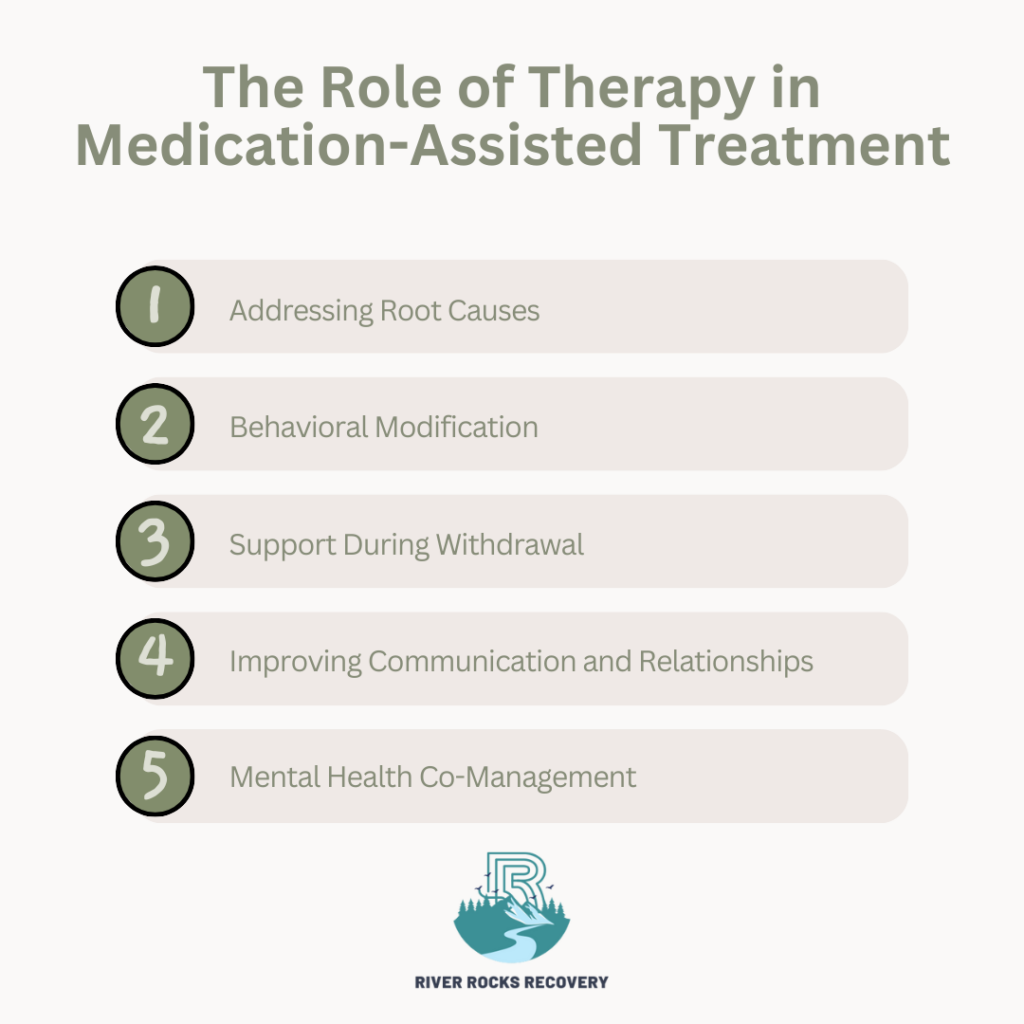Opiate addiction is a silent assassin; it comes into our lives like a thief in the night and slowly strangles the breath out of us. It turns into a very terrible enemy that destroys our physical, psychological, and spiritual aspects. If you or your loved one is dealing with this silent killer, there is no need to worry, as there is hope!
Yes, you heard it right! For those struggling to overcome their addiction and growing stronger day by day to break that frightening cycle of dependence, Medication-Assisted treatment (MAT) is a ray of light in the dark. This form of treatment has been embraced because it enhances the use of medication, counseling, and cognitive-behavioral therapy in an individualized manner.
Let this blog post reveal to you all how useful MAT is in opiate addiction treatment and addiction therapy programs.
MAT (Medication-Assisted-Treatment): Know Everything About It!
First, you must be fully introduced to exactly what medication-assisted treatment is. So, medication-assisted therapy is a form of rehabilitation that involves the use of psycho-social interventions as well as medical substances for the treatment of substance use disorders, which include opiate dependence.
The main purpose of MAT is to decrease or eliminate withdrawal signs and desire for the substance, thus helping a person to come out of addiction successfully.
How Does Medication-Assisted Treatment Work?
Now the question is how MAT works. MAT works by giving medications that control the withdrawal signs and the urge to use opiates again in patients. These medications enable people to cut down their opiate intake in a more orderly manner while concentrating on their respective behavioral therapy and counseling.
MAT involves the use of medications such as methadone, buprenorphine (Suboxone), and naltrexone (Vivitrol) to help manage the physical symptoms of withdrawal and reduce the cravings that make staying clean difficult. These medications don’t offer a “cure” but serve as essential tools in controlling and managing opiate addiction.
Combined with therapies like Cognitive-Behavioral Therapy (CBT), Dialectical Behavior Therapy (DBT), and Family Therapy, MAT addresses not only the physical aspects of addiction but also the mental and emotional challenges individuals face during recovery. This holistic approach increases the chances of long-term success.
The Medications Used in MAT Can Include
Methadone: an artificially produced opioid that helps to alleviate withdrawal symptoms as well as cravings.
Buprenorphine (Subutex or Suboxone): an opioid analgesic drug that is used to break the cycle of opioid dependency and helps in tapering withdrawal symptoms and cravings.
Naloxone (Narcan): An opioid antagonist, sometimes known as an opioid blocker, is a drug that works against opioids.
Clonidine: a drug that is used in the treatment of hypertension and that can effectively minimize withdrawal signs.
The Benefits of Medication-Assisted Treatment for Opiate Addiction
Reduced Cravings and Withdrawal Symptoms
MAT helps alleviate the often unbearable physical symptoms of opiate withdrawal, allowing individuals to focus on their recovery without constantly battling the urge to use.
Improved Long-Term Outcomes
Research has shown that individuals in MAT programs have better long-term recovery outcomes compared to those in abstinence-only programs. MAT supports sustained recovery by reducing relapse rates and promoting stability.
Increased Retention in Treatment Programs
Because MAT reduces the immediate challenges of withdrawal, individuals are more likely to remain in Addiction Treatment Programs, including Alcohol Rehab Treatment and Drug Rehab Treatment. This continued participation is key to achieving lasting recovery.
Harm Reduction
For individuals not yet ready for complete abstinence, MAT offers a harm-reduction strategy. By stabilizing opioid use through regulated medications, individuals experience fewer life-threatening risks associated with illicit drug use.
Personalized Treatment Options
MAT is not one-size-fits-all. River Rocks Recovery offers a personalized approach to each individual’s needs, integrating MAT with behavioral therapies like CBT and DBT, along with group and family therapy sessions. This multi-dimensional approach is designed to address the unique challenges each patient faces.
Advantages of Medication- Assisted treatment
MAT has several benefits that make it an effective approach to opiate addiction recovery:
Reduces withdrawal symptoms
MAT medications assist with the minimization of withdrawal symptoms so that the patient can endure the process of detoxification.
Reduces cravings
Substances that are administered whenever practicing MAT help in the reduction of withdrawal symptoms and thus help users to work on other aspects, including behavioral therapy as well as counseling sessions.
Improves retention
Patients on MAT are more compliant with the treatment regimens and are less likely to relapse.
Enhances motivation
MAT can enhance the level of motivation to change the undesirable pattern of behavior and participate in the recovery process.
Increases safety
MAT is less likely to cause an overdose and other complications that are likely to occur when a patient is in the process of withdrawing from opiates.
So, these are the benefits of utilizing MAT for opiate addiction rehabilitation.
MAT in Different Levels of Care
MAT is highly adaptable and can be used in various treatment settings:
- Partial Hospitalization Program (PHP): MAT can be administered alongside intensive daily therapies, offering structured support without full residential care.
- Intensive Outpatient Program (IOP): Individuals who need flexibility in their schedules can benefit from MAT while attending therapies during designated hours.
- Outpatient Program (OP): For those in later stages of recovery, MAT can still play an important role in maintaining stability as they transition to less intensive forms of care.
The Role of Therapy in MAT Programs

MAT works best when paired with therapy. Cognitive-Behavioral Therapy (CBT) helps individuals change the negative thinking patterns and behaviors that contribute to addiction. Dialectical Behavior Therapy (DBT) focuses on teaching emotional regulation and distress tolerance, while Family Therapy ensures that the individual’s support system is engaged in the healing process.
These therapeutic methods, combined with the physical stabilization provided by MAT, create a comprehensive treatment approach that addresses both the root causes and the symptoms of addiction.
Get Recover Faster With River Rocks Recovery
For the process of recovering from opiate addiction, seeking professional help for medication-assisted treatment is very important. Get in touch with Rover Rocks Recovery! We make use of cognitive-behavioral therapies and pharmacological interventions to successfully cope with withdrawal symptoms and overcome cravings, which are vital in avoiding relapse and effectively making a lasting recovery.
Any person or relative who is addicted to opiates should consult River Rocks Recovery, a licensed healthcare professional for a prescription of MAT.
Final Thoughts
Medication-Assisted Treatment is an invaluable tool for those battling opiate addiction, offering a safe and effective way to manage withdrawal symptoms, reduce cravings, and provide a solid foundation for recovery. When combined with therapy and a structured treatment plan like those offered at River Rocks Recovery, MAT can lead to long-term recovery and a new, fulfilling life free from the grips of addiction. Call us today at (888) 905-6281 to take the first step toward recovery. We’re here to help!
FAQ Role of Medication-Assisted Treatment
What medications are used in Medication-Assisted Treatment for opiate addiction?
MAT for opiate addiction commonly includes medications like methadone, buprenorphine (Suboxone), and naltrexone (Vivitrol), which help reduce withdrawal symptoms and cravings.
Can I still participate in therapy while on Medication-Assisted Treatment?
Yes. MAT is most effective when combined with behavioral therapies like CBT, DBT, and group therapy, which address the mental and emotional aspects of addiction.
How long will I need to be on MAT?
The length of time on MAT varies depending on the individual’s needs. Some may only require it for a short period, while others may benefit from longer-term use. Your healthcare provider will work with you to determine the best duration for your treatment.
Does River Rocks Recovery offer MAT for both inpatient and outpatient programs?
Yes, we offer MAT across different levels of care, including Partial Hospitalization Programs (PHP), Intensive Outpatient Programs (IOP), and Outpatient Programs (OP), ensuring that each individual gets the level of support they need.
Is MAT covered by insurance?
Many insurance plans, including those for Opiate Rehab Treatment and Drug Rehab Treatment, cover MAT. We recommend checking with your provider or contacting River Rocks Recovery for more information.




























